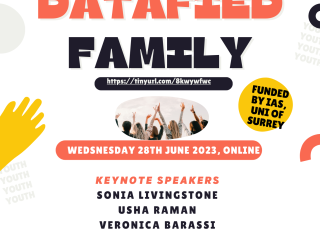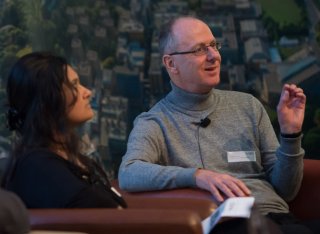
About
Biography
I am a Professor in the School of Social Sciences at the University of Surrey, where I am a member of the Senate, and where I sit on the University Research and Innovation Committee. My research interests span technology use and user centric research on algorithms, datafication, and broader digital technologies.
I dovetail these interests often with my interest in families, parenting and parenthood. I also have a longstanding background of interest and expertise in media audiences, including 'audiences' in transforming media environments. I hold a PhD from the Department of Media and Communication at the London School of Economics(2008-2011) where I was supervised by Professor Sonia Livingstone. I was Post-doctoral Fellow at Leuphana, University of Luneburg(2011-2012) and Lecturer at the School of Media, Communication and Sociology at the University of Leicester (2012-2017).
I joined the University of Surrey as Senior Lecturer in 2017, was promoted to Reader in 2018 and promoted to Professor in 2021. I have directed a research consortium on the future of audiences in the context of emerging technologies (funded by the AHRC, 2015-2018), and have been Chair of the Audience and Reception Studies division of the ECREA (2014-2017).
Current and recent projects -
2023-2025: Leverhulme Research Project Grant: Parents', news use, risks and crises in datafied societies (PI)
New book: ‘Parents talking algorithms’: Published in December 2024, with Bristol University Press.
2023-2025: British Academy Grant: Linguistic minority families, emerging technologies, and the raising of bilingual children (PI)
2022-2023: Data-driven media personalisation (Co-I): Funded by AI4ME, with Philip Jackson (FEPS), Rhianne Jones (BBC) and Yen Nee Wong (Kent)
Outside of these current and recent projects, my work has been funded by the Wellcome Trust, the British Academy, the Arts and Humanities Research Council and the ESRC impact fund.
Potential PhD students: I am happy to consider PhD proposals in various areas within sociology and media and communications.
Areas of specialism
University roles and responsibilities
- Academic Member of Senate
- Member of University Research and Innovation Committee
My qualifications
News
ResearchResearch interests
My work is at the intersections of sociology and media and communication studies with a specific focus on technology use, user cultures, and audiences. I started off researching audiences of diverse media formats/genres, and since have developed a keen interest in users experiences around technology, including AI, algorithms more broadly and other emerging technologies. My work looks into use in its broadest sense - the contexts, practices, purposes, hopes, expectations, worries, emotions that people bring to data and digital tech.
Current projects:
Leverhulme Research Project Grant 2023-2025: Parents', news use, risks and crises in datafied societies: From autumn 2023, I am PI on a Leverhulme Research Project Grant investigating parents' engagement with mediated risks and crises, in relation to their news consumption in contemporary datafied societies. My Co-Is are Tom Roberts and Emily Setty.
2023-2025: British Academy Grant: Linguistic minority families, emerging technologies, and the raising of bilingual children: From August 2023, I am PI on a British Academy Grant investigating families' engagement with emerging technologies as they raise bi or multilingual children. My Co-I is Dr Doris Dippold.
2023-2024: FASS Sabbatical Book Project: ‘Parents talking algorithms’: Over the course of 2023, generously supported by a research sabbatical from the University of Surrey, an Erasmus Visiting Fellowship to the University of Bergen in Norway and a Data & Society Fellowship at Malmo University, Sweden - I am conducting research and writing on my next book project. I ask in this work, what parents feel about algorithms in their children's lives, including social media algorithms or those in the public domain.
Citizens' Councils on Data-Driven Media Personalisation: 2022-2023: Over the course of 2022, I have co conducted research with Dr Philip Jackson of the Faculty of Engineering and Physical Sciences, Dr Rhianne Jones of the BBC, and later, Dr Yen Nee Wong (Kent) on citizens' views on the use of personal data in media personalisation. This work has involved a "citizens' council" approach where we have spent the spring and early summer of 2022 doing fieldwork in Guildford, Manchester and Woking, listening to citizens' hopes and anxieties around the use of personal data in media personalisation technologies. A summary of the work can be found here. Our work from this project is now under review in a variety of places.
Recently completed projects on users and audiences
The Future of Audiences
With funding from the Arts and Humanities Research Council, I directed CEDAR - Consortium on Emerging Directions in Audience research, where I led a 29 member research team with Brita Ytre-Arne. The team conducted a foresight analysis exercise on the future of audiences' engagement with media technologies in the context of the IOT and datafication in 2030. This work was funded by the AHRC, UK, and has led to a range of publications (please see publications section). This led to my book with Brita Ytre-Arne - The Future of Audiences (2018), and various papers on audiences' communicative agency and an agenda for audience research in the face of emerging technologies.
Provocative Screens
Using a combination of field research methods, I researched German and British public reactions to 'offensive' television content (my book Provocative Screens with Anne Graefer, Palgrave) and people's regulatory expectations from institutions.
Parents as users - 5 cross-cutting projects on parental use of technology
My work in 2021-2022 on the complex role of the digital during the pandemic, led to this paper in New Media and Society. Over 2020-2022, jointly with Paul Hodkinson I did significant research and impact work funded by the ESRC's Impact Acceleration account. This has been a partnership with the Institute of Health Visiting and the National Childbirth Trust. Pooling together academic research and professional expertise in the area of mental health support for new parents, we have developed resources for parents and practitioners to better support perinatal mental health over the course of 2020 and 2021. Please visit the project website for more information. My British Academy project (2016-2018) investigated digital technologies and women's peri-natal experiences in the UK - looking at apps, forums, social networking sites, vlogging sites and other areas. This led to a research monograph with Routledge on the above titled Early Motherhood in Digital Societies (Routledge, 2020), and related journal articles. My Wellcome Trust project (2018-2019) investigated the health communication practice of South Asian migrant mothers with postnatal mental health difficulties and my Surrey - FASS funded project with Paul Hodkinson on new fathers, mental wellbeing and social media technologies led to a co-authored book with Paul Hodkinson titled New Fathers Mental Health and Digital Communication (2021).
Research interests
My work is at the intersections of sociology and media and communication studies with a specific focus on technology use, user cultures, and audiences. I started off researching audiences of diverse media formats/genres, and since have developed a keen interest in users experiences around technology, including AI, algorithms more broadly and other emerging technologies. My work looks into use in its broadest sense - the contexts, practices, purposes, hopes, expectations, worries, emotions that people bring to data and digital tech.
Current projects:
Leverhulme Research Project Grant 2023-2025: Parents', news use, risks and crises in datafied societies: From autumn 2023, I am PI on a Leverhulme Research Project Grant investigating parents' engagement with mediated risks and crises, in relation to their news consumption in contemporary datafied societies. My Co-Is are Tom Roberts and Emily Setty.
2023-2025: British Academy Grant: Linguistic minority families, emerging technologies, and the raising of bilingual children: From August 2023, I am PI on a British Academy Grant investigating families' engagement with emerging technologies as they raise bi or multilingual children. My Co-I is Dr Doris Dippold.
2023-2024: FASS Sabbatical Book Project: ‘Parents talking algorithms’: Over the course of 2023, generously supported by a research sabbatical from the University of Surrey, an Erasmus Visiting Fellowship to the University of Bergen in Norway and a Data & Society Fellowship at Malmo University, Sweden - I am conducting research and writing on my next book project. I ask in this work, what parents feel about algorithms in their children's lives, including social media algorithms or those in the public domain.
Citizens' Councils on Data-Driven Media Personalisation: 2022-2023: Over the course of 2022, I have co conducted research with Dr Philip Jackson of the Faculty of Engineering and Physical Sciences, Dr Rhianne Jones of the BBC, and later, Dr Yen Nee Wong (Kent) on citizens' views on the use of personal data in media personalisation. This work has involved a "citizens' council" approach where we have spent the spring and early summer of 2022 doing fieldwork in Guildford, Manchester and Woking, listening to citizens' hopes and anxieties around the use of personal data in media personalisation technologies. A summary of the work can be found here. Our work from this project is now under review in a variety of places.
Recently completed projects on users and audiences
The Future of Audiences
With funding from the Arts and Humanities Research Council, I directed CEDAR - Consortium on Emerging Directions in Audience research, where I led a 29 member research team with Brita Ytre-Arne. The team conducted a foresight analysis exercise on the future of audiences' engagement with media technologies in the context of the IOT and datafication in 2030. This work was funded by the AHRC, UK, and has led to a range of publications (please see publications section). This led to my book with Brita Ytre-Arne - The Future of Audiences (2018), and various papers on audiences' communicative agency and an agenda for audience research in the face of emerging technologies.
Provocative Screens
Using a combination of field research methods, I researched German and British public reactions to 'offensive' television content (my book Provocative Screens with Anne Graefer, Palgrave) and people's regulatory expectations from institutions.
Parents as users - 5 cross-cutting projects on parental use of technology
My work in 2021-2022 on the complex role of the digital during the pandemic, led to this paper in New Media and Society. Over 2020-2022, jointly with Paul Hodkinson I did significant research and impact work funded by the ESRC's Impact Acceleration account. This has been a partnership with the Institute of Health Visiting and the National Childbirth Trust. Pooling together academic research and professional expertise in the area of mental health support for new parents, we have developed resources for parents and practitioners to better support perinatal mental health over the course of 2020 and 2021. Please visit the project website for more information. My British Academy project (2016-2018) investigated digital technologies and women's peri-natal experiences in the UK - looking at apps, forums, social networking sites, vlogging sites and other areas. This led to a research monograph with Routledge on the above titled Early Motherhood in Digital Societies (Routledge, 2020), and related journal articles. My Wellcome Trust project (2018-2019) investigated the health communication practice of South Asian migrant mothers with postnatal mental health difficulties and my Surrey - FASS funded project with Paul Hodkinson on new fathers, mental wellbeing and social media technologies led to a co-authored book with Paul Hodkinson titled New Fathers Mental Health and Digital Communication (2021).
Supervision
Postgraduate research supervision
Potential PhD students: I am happy to consider PhD proposals in various areas within sociology and media and communications. Within topics based in sociology - my interests lie in parents, motherhood/maternity, fatherhood, migrant parents, families, relationships, childhood, youth, mental health, vulnerabilities and inequalities in parenthood, and digital sociology. In terms of topics relating to media and communications, I am interested in both media audiences as well as users and use of media and digital technologies including emerging and new technologies including but not restricted to AI, the Internet of Things, VR and other related areas.
My past/current supervision topics include -
Uses of datings apps by LGBTQ+ users
Digital activism in the global south against sexual violence
Young audiences, Eastern Europe and Disney princesses
Telenovela reception
Distant suffering and television audiences
Teaching
I directed our BSc in Media and Communication degree from 2017 to 2021, where I led the degree through a significant revamp in 2018-2019. This degree enables students to delve into theories of media power, regulation and audiences, critical studies of data and datafication, platform societies and global media and communication.
My teaching in the Department consists of compulsory modules, where I teach on topics directly related to my research interests and expertise. For the forthcoming future, subject to any last minute changes my teaching portfolio includes -
- Global Media and Communication (Year 2)
- Data and the Digital in Platform Societies (Year 3)
I also supervise Undergraduate as well as Postgraduate dissertations each year.
I am currently supervising PhD projects on -
- Indonesian audiences and Disney
- Indian women's digital activism against sexual violence
- Dating app user experiences
Publications
Highlights
Books
Das, R. (2024). Parents talking algorithms: Navigating Datafication and Family Life in Digital Societies. Parents engage with algorithms daily in contemporary digital societies. These algorithms are entwined with the most routine of everyday parenting tasks. Algorithms interface with parents’ interactions with search engines, their sharing and sharenting practices on social media, their children's entertainment, their engagement with the news, and more. This book explores parents’ awareness of the pervasive role of algorithms in shaping parenting practices and everyday life. It critically examines how parents navigate algorithmic environments and how they prepare for their children's futures in a world increasingly dominated by data, algorithms, automation, and artificial intelligence. Drawing on an in-depth study of 30 English parents, this work illuminates the hopes and fears parents speak of, in relation to algorithms and datafication. The book delves into their agency, their experiences of and interactions with algorithms in various contexts, including searching for information, sharing content, consuming news, and more. It looks into parents’ algorithmic literacies, whilst remembering the critical importance of holding powerful institutions accountable for their actions. This book should be of interest to social scientists, policymakers, and general readers interested in the intersection of families, platforms, parenting and digital technologies. It offers a nuanced understanding of parents’ agency, struggles, hopes and fears around algorithms shaping contemporary parenting in datafied societies.
Hodkinson, P. & Das, R. (2021). New Fathers, Mental Health and Digital Communication. London: Palgrave
This book analyses in-depth, qualitative material on new fathers’ experiences of mental health difficulties after having a baby and, in particular, their use of online communications as part of their coping practices. Arising out of a project funded by the Faculty of Arts and Social Science at the University of Surrey that centred on in depth interviews with 15 fathers, at the heart of the book are the ways discourses of masculinity and fatherhood can exacerbate fathers’ difficulties and prevent them from communicating with others, and the extent to which social media may provide opportunities to negotiate, escape from or contest such discourses through engaging with information and others, disclosing struggles and seeking support. We examine the digital mediation of emotions around paternal mental health, the emergence of new, networked paternal intimacies, and new forms of connection and disconnection which shape, resource, and potentially empower fathers communicating about mental health.
Das, R. (2019). Early Motherhood in Digital Societies: Ideals, anxieties and ties of the perinatal. London: Routledge
Early Motherhood in Digital Societies offers a nuanced understanding of what the digital turn has meant for new mothers in an intense and critical period before and after they have a baby, often called the ‘perinatal’ period. The book looks at an array of digital communication and content by drawing on an extensive research project involving in-depth interviews with new mothers in the United Kingdom and online case studies. The book asks: what does the use of technology mean in the perinatal context and what implications might it have for maternal wellbeing? The book argues for a balanced and context-sensitive approach to the digital in the context of perinatality and maternal wellbeing in the critical perinatal period.
Das, R. & Ytre-Arne, B. (2018). The future of audiences: A foresight analysis of interfaces and engagement. London: Palgrave Macmillan
This book brings together contributions from scholars across Europe to present findings from a foresight analysis exercise on audiences and audience analysis, looking towards an increasingly datafied world. The book uses knowledge emerging out of three foresight exercises, produced in cooperation with more than 50 stake-holding organisations and building on systematic reviews of audience research, to arrive at a renewed agenda for audience studies.
Das, R. & Graefer, A. (2017).Provocative Screens. Offended Audiences in Britain and Germany. Palgrave Macmillan (Pivot)
This book offers a nuanced understanding of ‘offensive’ television content by drawing on an extensive research project, involving in-depth interviews and focus groups with audiences in Britain and Germany. Provocative Screens asks: what makes something really offensive and to whom in what context? Why it offence felt so differently? And how does offensive content matter in public life, regulation, and institutional understandings?
JOURNAL ARTICLES
- Setty, E; Boursinou, N; Roberts, T; Das, R. (2026): Parents’ news mediation in a risk society: Navigating trust, anxiety and digital literacy. Communication Review. Online First.
- Das, R. Wicaksono, G. (In Press). The individualised audiences of everything and nothing: In search of the collective in teaching and researching audiences. European Journal of Cultural Studies.
- Setty, E; Boursinou, N; Das, R; Roberts, T. (Under Review): Raising children in a ‘risky’ world: How parents’ news use shapes trust, anxiety, and family decisions.
- Das, R; Boursinou, M; Roberts, T; Setty; E. (2025) What does local news use have to do with raising children? Four dimensions of local news in English parent's news use. Journalism. Online First.
- Trueltzsch-Wijnen, C; Das, R.; Chimirri, N; Jorge, A. (2024)Mediated parent networks as communicative figurations: Practical sense and communicative practices among parents in four European countries. Communications: The European Journal of Communication Research
- Das, R. (2024). Data reflexivity as work in progress: A relational, life-course approach to people's encounters with datafication. Convergence. Online First.
- Das, R.; Chimirri, N; Jorge, A; Trueltzsch-Wijnen, C. (2024). Mediated parent networks: Explorations on the digital shaping of parents’ support networks in Austria, Denmark, Portugal and England. Families Relationships and Societies
- Das, R; Wong, Y; Jones, R; Jackson, P. (2024): How do we speak about algorithms and algorithmic media futures? Reflections on using Vignettes and scenarios as a data collection method in citizen councils on data-driven media personalisation
- Das, R. (2023): Parents’ understandings of social media algorithms in their children’s lives: Misunderstandings, parked understandings, transactional understandings and proactive understandings. Journal of Children and Media
- Das, R. (2023): Parents’ algorithm literacies in digital societies: Contexts, dimensions and markers of parents’ algorithm literacies amidst Datafied parenthood. The Communication Review
- Wong, Y; Das, R; Jones, R; Jackson, P. (2023): Conditional trust: Citizens’ council on data driven media personalisation and public expectations of transparency and accountability. Big Data and Society
- Das, R. (2022). Approximately in-person in the locked-down home: Approximation, digital ties and maternity amidst the COVID19 lockdown. New Media & Society
- Das, R. & Beszlag, D. (2021). Migrant mothers' experiences of perinatal mental ill health in the UK and their expectations of healthcare. Journal of Health Visiting Online First.
- Das, R. (2021). Women's experiences of maternity and perinatal mental health services during the first Covid-19 lockdown. Journal of Health Visiting.
- Ytre-Arne, B.; & Das, R. (2020). Audiences’ communicative agency in a datafied age: Interpretative, relational and increasingly prospective. Communication Theory
- Das, R. & Hodkinson, P. (2020). Affective coding: Strategies of online steganography in fathers’ mental health disclosure. New Media and Society
- Das, R., & Hodkinson, P. (2019). Tapestries of intimacy: Networked intimacies and new fathers’ emotional self-disclosure of mental health struggles. Social Media+ Society, 5(2), 2056305119846488.
- Das, R. (2018). Temporally inexpensive, affectively expensive: Digitally mediated maternal interpersonal ties in the perinatal months. Communication, Culture and Critique
- Das, R. (2018). A Field in Flux: The Intriguing Past and the Promising Future of Audience Analysis. Television and New Media
- Ytre-Arne, B. &; Das, R. (2018). An agenda in the interest of audiences: Facing the challenges of intrusive media technologies. Television and New Media
- Das, R. (2018). Populist discourse on a British social media patient-support community: The case of the Charlie Gard support campaign on Facebook. Discourse Context and Media
- Das, R. (2018). The mediated subjectivities of the maternal: A critique of childbirth videos on YouTube. Communication Review.
- Zsubori, A. & Das, R. (2018). Twenty years of Pottermania: Youthful experiences of fantasy at the intersections of the fictive and ‘real’. Journal of Children and Media 12 (4).
- Das, R. & Graefer, A. (2017). Regulatory expectations of offended audiences: The citizen interest in audience discourse. Communication, Culture and Critique. Online First.
- Das, R. (2017). Speaking about birth: Visible and silenced narratives in online discussions of childbirth. Social Media + Society.
- Das, R & Ytre-Arne, B. (2017). Critical, Agentic, Transmedia: Frameworks and Findings from a Foresight Analysis exercise on audience research. European Journal of Communication.*Gold Open Access*
- Das, R. (2017). The mediation of childbirth: Joyful birthing and strategies of silencing on a Facebook advice and support group. European Journal of Cultural Studies, Online First
- Das, R. (2017). Audiences: A decade of transformations: Reflections from the CEDAR network on emerging directions in audience analysis. Media, culture and society. Online First.
- Das, R. (2017). Stories about a queen: Viewing Bengali television drama in urban India. Critical Studies in Television 12(3).
- Graefer, A. & Das, R. (2017). Towards a contextual approach: Audiences, television, and 'offensive' humour. European Journal of Cultural Studies.
- Das, R. (2016). “I've walked this street”: Readings of reality in British children's reception of the Harry Potter series. Journal of Children and Media 10(3)
- Das, R. & Ytre-Arne. B. (2016). After the excitement: An introduction to the work of CEDAR. Participations 13(1). pp 280-288
- Das, R. and Pavlickova, T (2014). Is there as author behind this text? A literary aesthetic driven understanding of trust in interactive media. New Media and Society 16 (3)
- Das, R. (2014) An appropriate inheritance: On being and not being an audience researcher. International Journal of Media and Cultural Politics 10 (2)
- Das, R. (2013). Introduction. In - Audiences: A cross-generational dialogue. A special issue of The Communication Review 16 (1)
- Das, R (2013). “To be number one in someone's eyes…” Children's introspections about close relationships in reading Harry Potter.European Journal of Communication 28 (5)
- Das, R. (2012). Children reading an online genre: Heterogeneity in interpretive work. Popular Communication 10 (4)
- Das, R (2012). The task of interpretation. Participations: The international journal of audience and reception studies. 9 (1)
- Das, R (2011). Converging perspectives in audience studies and digital literacies: youthful interpretations of an online genre. European Journal of Communication, 26: 4, 343-360
- Das, R (2010). Meaning at the Interface: new genres, new modes of interpretative engagement? Communication Review13 (2), 140-159
- Das, R (2010). Digital youth, heterogeneity and diversity. Journal of Media Practice 11: 3
BOOK CHAPTERS
- Ong. J. & Das, R. ( 2019). The contributions of television audience studies in the networked age: Looking back to look forward. In Shimpach, S. Eds (2019). The Routledge Companion to Global Television
- Das, R. (2018) Childbirth online: The mediation of contrasting discourses. In Mascheroni, G, Ponte, C. & Jorge, A. (Eds). Digital parenting: the challenges for families in the digital age. Gothenburg: Nordicom.
- Das, R. & Ytre-Arne, B. (2018). A new crossroads for audiences and audience analysis. In Das, R. & Ytre-Arne, B. (Eds). The Future of Audiences: A foresight analysis. London: Palgrave Macmillan.
- Das, R. (2018). From implications to responsibilities. In Das, R. & Ytre-Arne, B. (Eds). The Future of Audiences: A foresight analysis. London: Palgrave Macmillan.
- Das, R., Ytre-Arne, B. Mathieu, D., & Stehling, M. (2018) Our methodological approach: The intuitive-analytical balance. In Das, R. & Ytre-Arne, B. (Eds). The Future of Audiences: A foresight analysis. London: Palgrave Macmillan.
- Vesnic-Alejevic, L., Seddighi, G., Mathieu, D., & Das, R. (2018). Drivers and scenarios for 2030. In Das, R. & Ytre-Arne, B. (Eds). The Future of Audiences: A foresight analysis. London: Palgrave Macmillan.
- Ytre-Arne, B. & Das, R.( 2018). Where next for audiences in communication? An emergent research agenda. In Das, R. & Ytre-Arne, B. (Eds). The Future of Audiences: A foresight analysis. London: Palgrave Macmillan.
- Das, R., Kleut, J., & Bolin, G. (2014). New Genres-New Roles for the Audience?. Audience Transformations Shifting Audience Positions in Late Modernity, 30-46.
- Livingstone, S & Das, R. (2012). The End of Audiences? Theoretical echoes of reception amidst the uncertainties of use. Chapter for the Blackwell Companion to New Media Dynamics, edited by John Hartley, Jean Burgess and Axel Bruns
- Das, R (2010). The task of interpretation: converging perspectives in audience research and digital literacies? In Nico Carpentier, et. Al. (Eds.)Media and Communication Studies Intersections and Interventions. Tartu: University of Tartu Press
GUEST-EDITED SPECIAL ISSUES
- Das, R. Eds. (2018). A field in flux: The intriguing pasts and the promising future of audience analysis. Special issue of Television and New Media
- Das, R. & Ytre-Arne, B. Eds. (2016). Emerging directions in audience research: Lessons from the Consortium on Emerging Directions in Audience Research. Special Issue of Participations, 13(1).
- Das, R. Eds (2013). Audiences: A cross-generational dialogue. A special issue of The Communication Review 16 (1)







